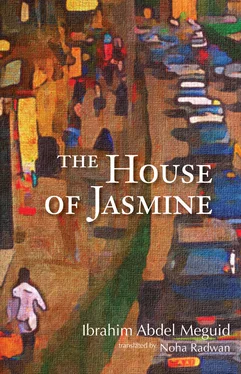“Hassanayn, please,” I implored. “I can’t laugh anymore.”
“Then don’t laugh,” he said.
“O.K. O.K. Have you ever known me to be a liar?”
“The biggest liar in Egypt and the whole Arab world as well.”
“O.K., but now I want you to believe me. I only want two things: the first is to get married and the second is to quit the union.”
#
I went to visit Hassanayn, and he wanted me to choose one of two women: the first was a beautiful young widow, who wore a veil and had an apartment, a child, and a large bank account left to her by her former husband, who had drowned in the Tigris. The second was a typist who was not as pretty as the first. The widow was twenty-four, while the unmarried woman was twenty-six. Hassanayn innocently told me that ever since I had told them the story about the man who threw his furniture into the sea, he had been thinking of finding me a wife, and that he had been serious when he mentioned it the first time. He also whispered to me that if Ibtihal hadn’t been his cousin, he would have preferred me to himself and let me marry her, because he saw me as a child who is lost in the desert. He was not serious about what he said, but I still felt embarrassed. First he had thought that I didn’t want to get married, then he thought that I was incapable of finding a wife. He had done all but take my hand and wander down the streets calling out: “A woman for this miserable man!” This paternal attitude of Hassanayn’s annoyed me, but I still said that I wanted to see the unmarried woman. Hassanayn laughed when I told him my choice and said in a voice that was loud enough for his wife to hear: “The widow’s husband drowned in the Tigris. Is this our fault? And why did he have to swim in the Tigris in the first place? Couldn’t he have swum in the Euphrates?” I heard his wife laugh in the next room. I hadn’t thought that the unmarried woman was better than the widow; it was more like a random choice. Perhaps if I had thought about it carefully, I would have realized that the widow was better. She was prettier, richer, and already had a child who would therefore be easier to raise. Who knows? I thought that maybe I would be like my father, unable to have a child for twenty years. We made an appointment for me to see the woman the following week.
#
The day on which I had planned to quit the union drew near. I had been thinking about quitting since the very first day after I had won the elections, but couldn’t reveal my thoughts. To be honest with you, there were times when I changed my mind, but for the most part, I could not stand what I had to handle: absences, sicknesses, social aid, dismissal warnings, requests for leaves, organizing recreational trips to Port Said, suggestions for literacy classes and other classes to help the workers’ children with their school work. Where had all these responsibilities been and how come no one had mentioned them to me before the elections?
I spent my days running between the various workshops and administrative offices of the shipyard. I finally realized why al-Dakruri had been so thin and pale, and thought that his death was inevitable. If the snake hadn’t bitten him, he would still have died soon from a heart attack. My office was always full of workers who came in to tell me about their problems, but also took the opportunity to chat and enjoy a few laughs. I didn’t have time to take care of the employees’ files, which became covered with cobwebs and made my office look like a haunted house.
My apartment filled with workers who thought that a private meeting with me could help them get a promotion. Usta Zinhum always brought so many of them that I sometimes wondered if he were not just bringing people off the streets. My time and energy were completely wasted on these new responsibilities. I wasn’t used to this mess. I was used to silent papers placed in neat files that I could open at any time. I arranged them and changed things in them and they never objected.
At the end of one long day, as I was getting ready to leave the office, Usta Zinhum came running in. He was sweating and out of breath. I suddenly wished I had a bed in my office so that I would never even have to leave!
“A crisis, Shagara,” he said. “A real crisis.”
I felt my whole body tingling. He had just called me by my name without bothering to use Mr. or any other title.
“What happened, Usta Zinhum?” I asked.
“Imbabi is dead.”
“Imbabi who?”
“Imbabi. Don’t you know him?” He pulled up a seat and sat down, then said to me, “Have a seat first.”
I had already remembered Imbabi, about whom one of the workers had told me during my campaign, when Usta Zinhum said, “Imbabi, the lunatic. He was found dead on the beach, his body surrounded with crushed fish, his mouth reeking with the smell of fish and covered with clotted blood. Now dozens of workers are gathered around the body. They say that he had recently started to eat the fish raw, and that today he ate so much that it bloated him. The problem is that nobody knows his address or any of his relatives.”
I pointed at the files and asked him to look under “I” and “M,” then sat back in my seat and let my arms relax to my sides. The round man bounced like a rubber ball and soon he pulled out a file, placed it in front of me, and opened it.
“The file only has one page,” he said. I looked at the sheet of paper, which only had his name, age, job, and salary at the time when he was first hired. There was no address, and there was nothing to indicate any change in his life: a marriage, a promotion, sickness, punishment, transfer. Nothing. There was only one yellowed sheet of paper, partially eaten by weevils.
“This is what I expected. The union will take care of his burial,” Usta Zinhum said while I watched him silently. I wanted to slap him on the face, he who knew everything, that spy!
Burying the man wasn’t a difficult job. I left Usta Zinhum to handle it and went home. I looked in the mirror and couldn’t ignore the paleness of my face, which reminded me of al-Dakruri’s. I had no time to cook and lived on canned foods, although I often read in the papers that they weren’t well preserved and not fit for human consumption. The other members of the union didn’t help. They only passed the workers’ problems and demands on to me. I had to wait for the chairman of the board of shipyard directors to fulfill his promise to consider “the files” its own department and staff it with two more employees. I would be the head of that department and the supervisor of those new employees. The shipyard had placed an advertisement for these two new positions in the newspapers, and it was going to be a few more days before the promise could be fulfilled. I was waiting for that to happen before I quit the union. Then the chairman wouldn’t be able to go back on his decision. Actually, he could, but I didn’t think that he was going to. God was still on my side. I thought that I could sue the shipyard if the chairman went back on his decision, because I would have the right to keep my new position. Yes, I would defend my rights, because a person who doesn’t defend his rights is worthless.
The important thing was that my marriage plans developed quickly. I visited Hassanayn at the time that we had set, and found Nawal there visiting with his wife. Before I had had time to think about how I could introduce myself, Hassanayn called to his wife, “Why don’t you both come and sit with us?” She smiled, left the room for a minute, and then came back with a china plate that I had seen before, bananas piled upon it. Nawal followed her into the room and shook my hand.
Would anyone believe that that was the first time I had shaken hands with a woman? I was thirty-five years old, and had shaken the hands of many of my female colleagues and many of my mother’s female neighbors in the hills, but none of them had made me feel like a man shaking hands with a woman. Nawal’s hand was warm and it trembled a little. My hand was as cold as ice. I looked at her face while she looked down at the floor. She was as small as a cat, and sat with her knees and her legs pressed tightly together. She was pretty, and her eyelashes never stopped fluttering. She must have sensed that I was watching her. She must have been aware of my ulterior motive. Who knows? Maybe she was also looking at me somehow. I wondered whether that year, 1980, was going to be a decisive year in my life.
Читать дальше












